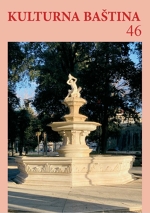PISMA IVE VOJNOVIĆA IZ OSOBNOG ARHIVSKOG FONDA ANTE TRESIĆA PAVIČIĆA
LETTERS BY IVO VOJNOVIĆ AS FOUND IN ANTE TRESIĆ PAVIČIĆ’S PERSONAL ARCHIVES
Author(s): Hania Mladineo MikaSubject(s): Theatre, Dance, Performing Arts, Archiving, Local History / Microhistory, Croatian Literature, Pre-WW I & WW I (1900 -1919), Interwar Period (1920 - 1939)
Published by: DRUŠTVO PRIJATELJA KULTURNE BAŠTINE - SPLIT
Keywords: Ivo Vojnović; Ante Tresić Pavičić; The Vojnović Family; correspondence; 20th century;
Summary/Abstract: The Vojnović family originated in Popovo Polje in Herzegovina. According to some historical sources, Prince Jovan Vujov Vojnović moved to Herceg Novi in around 1690, which was then under the Venetian rule. In the 1770s, Venice recognized the families of noble origin, as well as their coats of arms, and awarded them the title of prince. It was due to this exact recognition, which was also confirmed by Austria, that the family members used the title of the Užice Princes, since the city of Užice was in the possession of the Vojnović family. The Vojnovićs were prominent naval officers, lawyers, politicians and writers. At the turn of the 19th and 20th centuries, a significant mark in the political and cultural sphere was made by Konstantin Vojnović and his two sons, Ivo and Lujo. Ivo Vojnović was born in Dubrovnik on October 9, 1856. He attended the classical grammar school in Split and Zagreb, where he graduated in 1875, and then received his doctorate in law in 1879. In the period from 1883 to September 1903, he worked as a bailiff at the District Court in Križevci, then he was the court reporter at the Governorship in Zadar. He also served as a commissary at the Dubrovnik District Authority, an administrator at the Supetar District Authority and, finally, a secretary at the Zadar Governorship. In the period October 1903 – spring 1907, he once again held the position of a district administrator, but due to an accounting scandal, he was dismissed from the civil service without the right to a pension. In the same year, on June 13, he was appointed playwright of the Croatian National Theatre in Zagreb. In 1911, as he failed to renew his contract with Vladimir Treščec-Branjski, who was a theatre manager then, I. Vojnović decided to become a professional writer. The sudden death of his sister Katica in 1928 caused him severe emotional distress. As he had been seriously ill prior to her death, he decided to spend a certain amount of time at Zagreb sanatorium. Since the prospects of his recovery were rather slim, he accepted the invitation of the noble family Gavrilović Glučić to be a guest in their villa on the Topčidar Hill. He was soon admitted for the treatment at the sanatorium of Dr Zivković in 57 Krunska Street in Belgrade. He died there on August 30, 1929. He appeared in literature as early as 1880, when August Šenoa, then editor of Vijenac, published his short story Geranium. This was followed by the publication of a short story and a novel – Perom i olovkom and Ksanta. His debut play Psyche in 1889 marked a turning point in both the Croatian theatre and literature and provided him with the attribute of the pioneer of modern drama who managed to introduce Croatian dramaturgy into then current trends of the European drama production. In the personal archives of Ante Tresić Pavičić (Vrbanj on Hvar 1869 - Split 1949), which is kept in the State Archives in Split, there is correspondence containing a total of 937 letters; there are 6 postcards, 2 business cards, 1 telegram and 22 letters by Ivo Vojnović covering the period from 1907 to 1912. The letters had a private character, although some were written on the headed notepaper that belonged to the management of the Croatian theatre in Zagreb. In those letters, Vojnović presented and described various events and in connection with them his thoughts, feelings and hopes. He often inserted proverbs in Italian, French and German. In the letters, Vojnović addressed Ante Tresić Pavičić with: dear doctor, dear Tresić, dear friend, my dear friend. He ended them in the following manner: with the most cordial greetings, trust your loyal friend, greetings from yours, from the bottom of my heart, your loyal friend, may God follow you on your path, hugging you I remain yours, etc. According to their content, the letters are divided into five categories: 1 District administrator in Supetar (1907) 2 Playwright at the Croatian National Theatre in Zagreb and dismissal (1908 / 1910; specified year n/a) 3 Playwright at the Croatian National Theatre in Zagreb (1908 /1910) 4 Dismissal from the civil service (1908 / 1910; specified date and year n/a) 5 Professional writer (1912) Although there is a large number of critical reviews of Ivo Vojnović’s literary work, little is known of his emotional state and life that ensued when he, at the age of fifty-two and after twenty-five years of respectable literary career, was dismissed without the right to a pension, due to an accounting scandal. Therefore, the letters to Ante Tresić Pavičić, who was a representative at the Imperial Council and the only true friend, represent an invaluable source of information about both Ivo Vojnović and the environment in which this acclaimed artist lived and worked.
Journal: KULTURNA BAŠTINA : ČASOPIS ZA PITANJA PROŠLOSTI SPLITSKOGA PODRUČJA
- Issue Year: 2020
- Issue No: 46
- Page Range: 141-176
- Page Count: 36
- Language: Croatian

